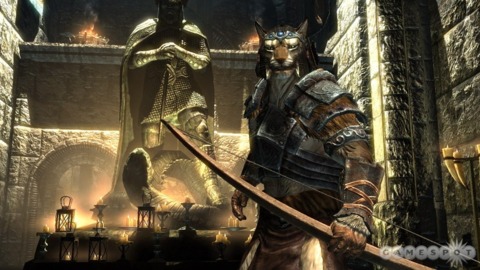Game marketers pull back the curtain
PAX 2011: Insiders including Bethesda's VP of marketing explain how companies sell to gamers from three different perspectives.
Who Was There: AKQA gaming account lead Ed Davis, Bethesda Softworks vice president of marketing and PR Pete Hines, and CBS Interactive/GameSpot regional sales manager Paul Caparotta.

What They Talked About: Each of the panelists had something unique to offer when it comes to marketing to gamers. Davis kicked off the panel by talking about segmentation of the audience and moving forward from that data. This approach differs from that of Hines, who believes that a good game can sell itself from intrigue and appeal at an early stage and that no marketing plan can force the buyer to buy a game. Meanwhile, GameSpot's Caparotta talked about how he creates marketing plans for the website, coming up with content that is relevant and appealing to the target audience.
At AKQA, Davis takes a more traditional approach by looking at segmentation, which is when the audience is divided into groups based on various factors. He talked about how there are many ways to approach marketing and planning, but segmentation helps explain who marketers should be talking to and why. In recent years, marketers have acknowledged that the audience has expanded beyond the 18-to-24-year-old male audience and that it is also more diverse.
Caparotta described the needs of the audience as a canvas that is constantly changing and evolving. According to the sales manager, now that mobile is becoming a "big deal," it is the audience that ultimately drives what's on the site from a marketing standpoint. He looks at what people are doing when visiting GameSpot and tries to determine whether people spend more time on video, screenshots, or something else.
Hines explained that he has been with Bethesda for 12 years and said that he likely doesn't approach marketing the same way other companies do because he insists that things be done his way. He doesn't take the time to break down the audience and figure out the demographic that he should be targeting. Instead, the philosophy behind Bethesda's marketing is, "We make games we would want to play. That's it," Hines said. "There's no great science to it."
He went on to explain that he doesn't understand why some marketing campaigns try to narrow their approach and appeal to males between the ages of 35 and 42 when he believes that, "gamers are gamers. It's a fool's errand." Instead, his approach is to engage through social media or asset blasts that include well-planned trailers and screenshots. While he may spend time tailoring those things to the audience, he doesn't spend a lot of time drilling down.
"I find it annoying and stupid," he said. "People who like games are people who like games." Hines understands that there are people who buy two games a year and those who buy 15 games, but he wouldn't necessarily use a different ad for each of them. He said that he didn't want to be a slave to that kind of thinking and instead wants to work on something that is appropriate for the audience.

Davis touched upon the fact that many people who go into video game marketing have their roots in the entertainment industry when it used to be primarily driven by consumer packaged goods. That line of conversation led to the fact that there are marketing people who don't know anything about games.
"I've met marketing guys that make my skin crawl," Hines stated. He pointed out that while the three panelists may be hardcore gamers, that is not necessarily a requirement. But Caparotta emphasized that knowing the difference between a Japanese role-playing game and a Western one would help tremendously.
The next topic had to do with the fact that the first time people experience a game isn't when the game is put into the console, but when those people consume media surrounding the game. This could be five days or five months in advance; what Bethesda tries to do is to get people excited about it. For Hines, the success of that depends on whether or not his team is excited about it.
"Cool is cool; you don't have to be a hardcore gamer to say, 'Yeah that's some s*** right there,'" he said.
While prerelease coverage is important to companies looking to promote their games during the course of development, Hines went on to criticize the media when it comes to labeling games. He described it as "lazy" when outlets generalize a game by comparing it to one or several others, and he says that it's a disservice to the game.
Hines went on to talk about one of Bethesda's commercials that was targeted at a different audience. During Rage's prerelease marketing plan, Bethesda put together a video with NBA star Blake Griffin that wasn't necessarily targeted at gamers (as hardly anyone in the room had seen it), but it was a funny video that put Rage in people's minds. Of all their trailers, Hines said that it was the most successful one with the most positive feedback. He pointed out that gamers were a "picky lot," and that he would never run something like that ad on a gaming website.

The panel brought up fantasy franchises like The Lord of the Rings and Game of Thrones because they have helped popularize fantasy. With The Elder Scrolls V: Skyrim nearing release in November, the popularity of those other fantasy genres have made it easier to market games to a wider audience.
The panel also discussed psychographics, a technique where certain consumer behaviors are analyzed, such as how and why people play the games that they do. This doesn't necessarily change what marketers do, but it gives them ideas for a particular plan or a story for broader appeal. Netflix was brought up an example, in that it tracks what people have watched and recommend other movie titles based on what they like.
In terms of Bethesda's approach to PAX, Hines indicated that the event's crowd is a "specific kind of nerdy." The VP said that Bethesda would do things at PAX that it wouldn't do anywhere else, such as have hands-on time for its games to the public. He also talked about the thought that goes into the displays and how they should mean something rather than just exist as a big space with art painted on the side. Bethesda set up an elaborate display for Fallout 3 in 2008, and Hines noticed that since then, other publishers have increased the size of their booths as well. He admitted that he likes to think he had something to do with how much PAX has grown as far as booth sizes go.
Quote: "…[Peter Jackson] slipped nerdiness into everybody's household while they weren't paying attention." --Pete Hines commenting on how fantasy is more acceptable, thanks to The Lord of the Rings and Game of Thrones.
Takeaway: Marketing is trying to catch up to the rapidly changing landscape of the video game industry. It is becoming more important for those who are interested in marketing to know their product inside and out. Hines expressed that it is unfortunate when a good game doesn't sell but a mediocre sequel does sell because of a huge marketing push. While marketing can never force someone to buy a game, it is crucial for marketers to plan far ahead of their release to get the game in people's minds.
Got a news tip or want to contact us directly? Email news@gamespot.com
Join the conversation